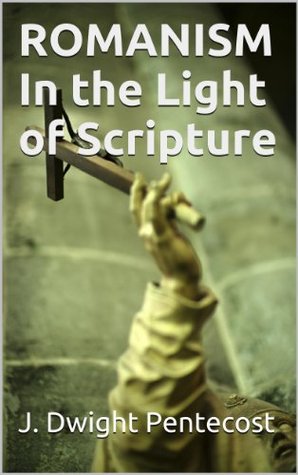- Bible
- Read the Bible
- Bible Versions
- Verse of the Day
- Reading Plans
- Verses by Topic
- Books of the Bible
- Bible Images
- Study
- Commentaries
- Concordances
- Dictionaries
- Encyclopedias
- Sermons
- Bible Atlas & Maps
- BP Wiki
- Devotionals
- Today's Devotionals
- Light of the World
- All Devotionals
- Inspirational Quotes
- More
- Picture Quotes
- Videos
- Inspirational
- Bible Study
- What The Bible Says
- Bible Q&As
- Daily Bread
- Bible by Genre
- Bible Stories
- Random Bible Verse
- Community
- Store
ROMANISM In the Light of Scripture
by Dwight Pentecost
Table of Contents
1. IS ROME A CHURCH OR A STATE?
2. IS MARY THE MOTHER OF GOD?
3. IS MARY CO-REDEMPTRIX?
4. WAS PETER THE FIRST POPE?
5. IS SALVATION BY WORKS OR BY FAITH?
6. IS THERE A PURGATORY?
7. WHAT IF THE VATICAN CONTROLS THE WHITE HOUSE?
PREFACE
THE DAYS IN WHICH WE LIVE are trying days for those who hold unreservedly to the truths of the Word of God. The spirit of ecumenicity captivates the thinking of professing Christendom. Men are being persuaded that it is unchristian and bigoted to exclude from our fellowship any who profess to be Christians, regardless of their doctrinal errors.
There is a need that believers in the Lord Jesus Christ should be taught not only the truths of the Scriptures but also the errors that pervert the Scriptures as well. To this end the author prepared a series of messages and delivered them to the congregation of the Grace Bible Church of Dallas, Texas, of which he is the pastor. Seven important questions were propounded, considered in the light of the teachings of Romanism, and answered from the Word of God. The response to these messages was such that they have been edited and published in this book.
May the Holy Spirit, whose ministry it is to take the things of Christ and show them unto us, guide us into all truths and guard us from all error through a consideration of the truths herein presented.
J. Dwight Pentecost
3909 Swiss Ave.
Dallas, Texas
1. IS ROME A CHURCH OR A STATE?
2. IS MARY THE MOTHER OF GOD?
3. IS MARY CO-REDEMPTRIX?
4. WAS PETER THE FIRST POPE?
5. IS SALVATION BY WORKS OR BY FAITH?
6. IS THERE A PURGATORY?
7. WHAT IF THE VATICAN CONTROLS THE WHITE HOUSE?
PREFACE
THE DAYS IN WHICH WE LIVE are trying days for those who hold unreservedly to the truths of the Word of God. The spirit of ecumenicity captivates the thinking of professing Christendom. Men are being persuaded that it is unchristian and bigoted to exclude from our fellowship any who profess to be Christians, regardless of their doctrinal errors.
There is a need that believers in the Lord Jesus Christ should be taught not only the truths of the Scriptures but also the errors that pervert the Scriptures as well. To this end the author prepared a series of messages and delivered them to the congregation of the Grace Bible Church of Dallas, Texas, of which he is the pastor. Seven important questions were propounded, considered in the light of the teachings of Romanism, and answered from the Word of God. The response to these messages was such that they have been edited and published in this book.
May the Holy Spirit, whose ministry it is to take the things of Christ and show them unto us, guide us into all truths and guard us from all error through a consideration of the truths herein presented.
J. Dwight Pentecost
3909 Swiss Ave.
Dallas, Texas
BUY NOW
Kindle Edition, 127 pages
Published January 20th 2014
© 2025 Bibleportal.com All rights reserved.

J. Dwight Pentecost is a Christian theologian best known for his book Things to Come. He currently is Distinguished Professor of Bible Exposition, Emeritus, at Dallas Theological Seminary, one of only two so honored. He holds a B.A. from Hampden-Sydney College and Th.M. and Th.D. degrees from Dallas Theological Seminary. During his academic career he has taught biblical subjects for nearly half a century (Philadelphia College of Bible, 1948-55; Dallas Theological Seminary, 1955-present). His nearly twenty books are written mostly for the general Christian reader.
Pentecost is possibly best known for his published writings, which are predominantly focused on issues of Christian living and the eschatological scriptures. Pentecost takes a Premillennial and Pretribulational view of the unfulfilled prophetic passages of the apocalyptic biblical literature. He takes a Dispensationalist position, however his Things to Come (1958) is characterized by a comprehensive review of almost every view on the biblical prophetic subject matter that has any form of prominence.
... Show more